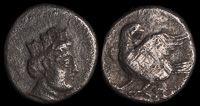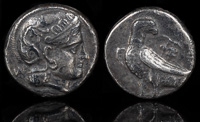Far Eastern
Foundation of a settlement at Susa.
Susa fights a battle with Kish.
Old Elamite period begins at Susa.
Susa is incorporated into the Akkadian Empire by Sargon the Great.
The governor of Susa, Kutik-Inshushinak, rebels against the Akkadians and creates an independent state.
Ur collapses under pressure from the Elamites and Susa becomes an Elamite city again.
Foundation of the First Dynasty of Babylon under Sumu-abum, establishing Babylon as a city-state in southern Mesopotamia.
Hammurabi becomes king of Babylon, initiating a period of expansion and codification of laws.
Code of Hammurabi is established in Babylon, one of the earliest and most complete written legal codes.
Hittite King Mursili I sacks Babylon, marking the end of the First Babylonian Dynasty.
The Middle Elamite period begins in Susa.
The Igihalkid dynasty controls Susa.
The Elamite king Untash-Napirisha constructs the Ziggurat at Chogha Zanbil near Susa.
Elamites under Shutruk-Nahhunte take the original Code of Hammurabi and bring it to Susa.
Kassite Dynasty ends with Babylon’s conquest by Elam.
The Elamite language begins to be used at Susa.
Sennacherib, the Assyrian king, destroys Babylon in retaliation for its rebellion.
Babylon revolts under Shamash-shum-ukin against Assyrian control, leading to a brutal siege by Ashurbanipal.
The Neo-Assyrian king Ashurbanipal levels Susa.
Nabopolassar establishes the Neo-Babylonian Empire and declares independence from Assyria.
The Medes capture Susa.
Nebuchadnezzar II becomes king of Babylon, overseeing its peak and monumental building projects, including the Ishtar Gate.
Nebuchadnezzar II captures Jerusalem, leading to the Babylonian Captivity of the Jews.
Baktria becomes part of the Achaemenid Empire under Cyrus the Great, existing as a key eastern satrapy.
Cyrus the Great of Persia captures Babylon, ending the Neo-Babylonian Empire; the city becomes part of the Achaemenid Empire.
Susa is captured by Cyrus the Great.
Babylon revolts against Darius I but is subdued by the Persians.
The army of Cyrus the Younger defeats that of Artaxerxes II at the Battle of Cunaxa at Babylon. However, Cyrus the Younger is killed. Orontas participates as the satrap of Armenia.
Peace of Antalkidas, arranged by Artaxerxes II, is signed in Susa, ending the Corinthian War. Abydos, Aigai, Kalchedon, Kaunos, Klazomenai, Kyzikos, Parion, Samos, and Adramytteion become part of the Persian Empire.
Alexander the Great enters Babylon after defeating Darius III at the Battle of Gaugamela.
October 21
Mazaios surrenders Babylon to Alexander III and he enters triumphantly. Mazaios is appointed satrap of Babylon.
July
Alexander the Great stops at Hekatompylos.
Alexander the Great invades Baktria, defeating Bessus (the satrap of Bactria who declared himself king after Darius III’s death) and taking control of the region.
August
Alexandria Eschate founded by Alexander the Great as his furthest outpost.
Amastris married to Krateros by Alexander the Great at the Susa Weddings.
Seleukos I Nikator marries Apama at the Susa weddings.
Alexander the Great meets his admiral Nearchos at Susa.
Kassander sent by Antipater to meet with Alexander III at Babylon in favor of a continued regency.
Philoxenos brings troops from Caria to Babylon.
Ptolemy I Soter marries the Persian Artakama at Susa as ordered by Alexander III.
June
Alexander IV and Philip III are chosen in Babylon as co-sovereigns.
June 11
Alexander the Great dies in Babylon, sparking the Wars of the Diadochi among his generals. Before dying, he gives his signet ring to Perdikkas.
June 30
Partition of Babylon. Abydos and Adramytteion come under control of Leonnatos. Egypt with Alexandria and Gaza are under Ptolemy. Baktria comes under Seleukos I Nikator. Asandros obtains Caria. Laomedon receives Koele-Syria.
September
Kynane of Macedon hatches a plan to marry her daughter, Adea Eurydike, to Philip III. She is killed by Alketas, the brother of Perdikkas, in the process, but soldiers are so disgusted at the murder that they escort Adea to Babylon.
October
Adea Eurydike is married to Philip III, most likely in Babylon.
December
Alexander IV is born to Roxana in Babylon.
Partition of Triparadisos. Abydos is given to Arrhidaios. Susa goes to Antigenes. Antipater is left in charge of Macedonia and is entrusted with Alexander IV and Philip III. Asandros is confirmed with Caria. Kleitos the White receives Lydia, replacing Menander. Laomedon is confirmed as satrap of Koele-Syria. Peithon is confirmed in Kophen. Seleukos receives Babylon.
Seleukos I Nikator joins Antigonos Monophthalmos on his way to Susa.
Peithon is appointed by Antigonos Monophthalmos as satrap of Babylon in place of Seleukos.
Antigonos Monophthalmos is received by Seleukos I Nikator in Babylon. When Antigonos demands income from the province, Seleukos flees to Ptolemy I Soter in Egypt.
Seleukos I Nikator gains control of Babylon, founding the Seleukid Empire and beginning Babylon’s decline as a center of power as Seleukos establishes Seleukeia on the Tigris.
Demetrios Poliorketes attempts to take Babylon from Seleukos I Nikator, but is defeated.
Seleukos I Nikator constructs Seleukeia on the Tigris.
The inhabitants of Babylon are moved to Seleukeia on the Tigris.
Diodotos I, the Seleukid satrap of Baktria, declares independence from the Seleukid Empire, establishing the Greco-Baktrian Kingdom.
The Parhi tribe takes Hekatompylos and makes it a capital of the Parthian Empire.
Antiochos III transports 2000 Jewish families from Babylon to Laodikeia ad Lykon.
Antiochos III of the Seleukid Empire campaigns in Baktria but eventually agrees to a peace with Euthydemos I, the Greco-Baktrian king, recognizing the kingdom’s independence.
Hekatompylos is the capital of the Arsakid Dynasty.
Menander I succeeds in expanding Greco-Baktrian control into northwestern India, reaching the peak of Greco-Baktrian influence.
141 BCE
Adiabene conquered by the Parthian king Mithridates I.
The Parthians capture Babylon, further diminishing its prominence as they establish their own empire.
Seleukeia on the Tigris comes under Parthian rule.
Yuezhi tribes (future Kushans) conquer Baktria, ending the Greco-Baktrian Kingdom and beginning the era of Kushan dominance in the region.
King from Adiabene participated in the Battle of Tigranocerta on the side of Tigranes the Great.
Mithridates III, the reigning monarch of the Parthians, is defeated by Orodes II at Seleukeia on the Tigris.
The Battle of Carrhae, in which the Parthians defeated the Romans. solidifies Parthian influence in Mesopatamia, including Adiabene.
36 CE
Queen Helena and her son Monobaz of Adiabene convert to Judaism.
48 CE
Queen Helena and King Izates of Adiabene send aid to Jerusalem, as noted by the Talmud and Josephus Flavius.
59 CE
Izates bar Monobaz dies, and his brother Monobaz II becomes the king of Adiabene.
Seleukeia on the Tigris is destroyed by Romans.
Susa is taken by the Parthians.
The Sasanian Empire, led by Ardashir I, defeats the Parthian Empire. Adiabene becomes part of the Sasanian Empire, losing its autonomy as a client state.
Susa is destroyed by the Sassanid Ardashir I.
April
July 2
The author and his wife visit Khojand, formerly called Alexandria Eschate, where his wife was born and grew up.






